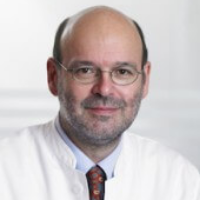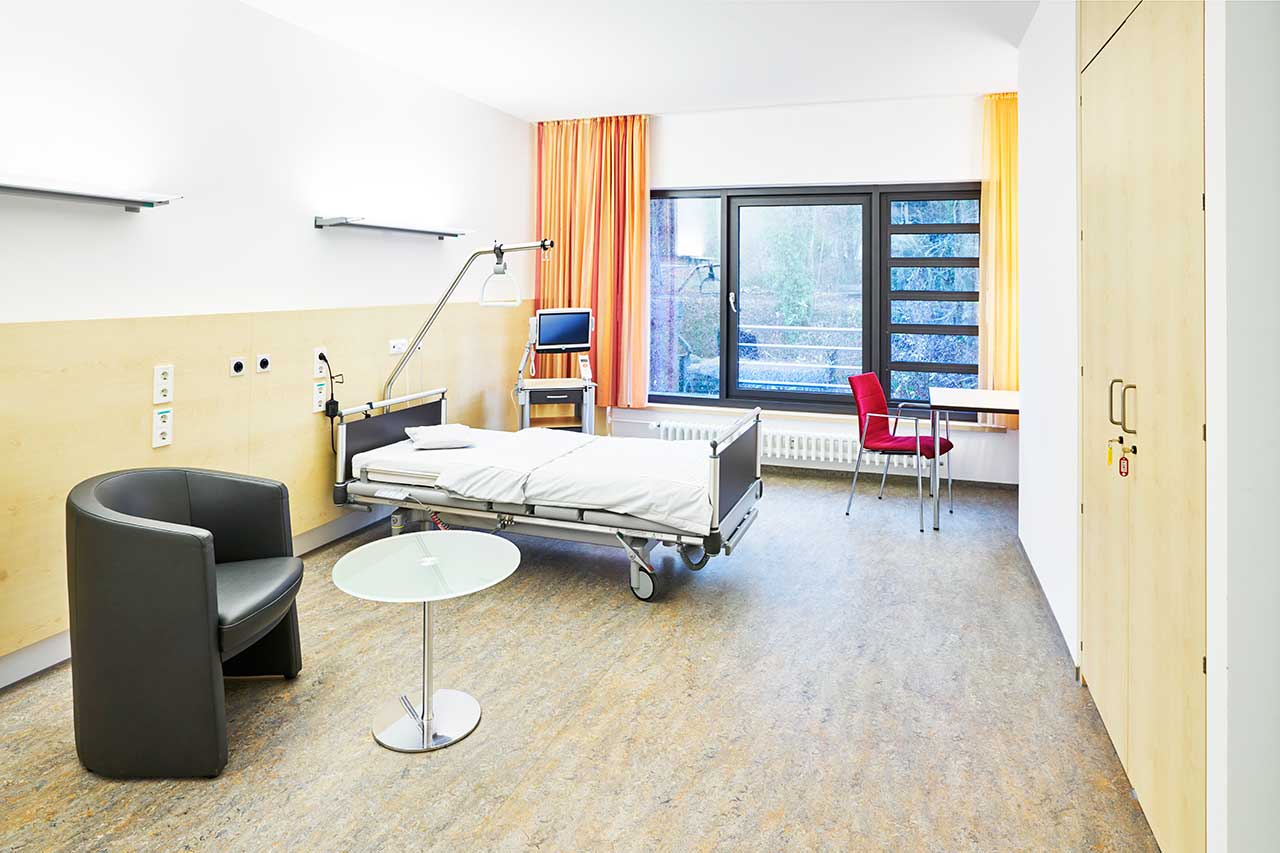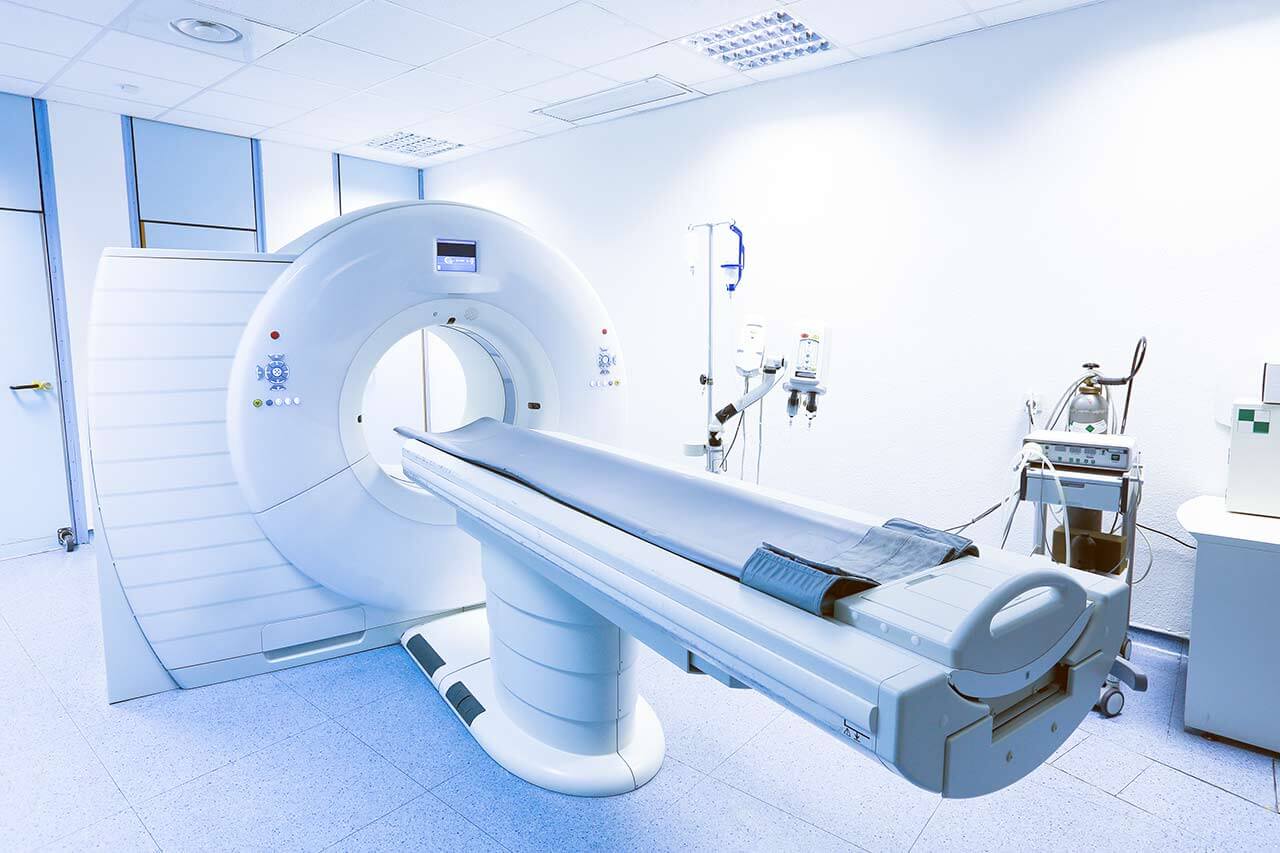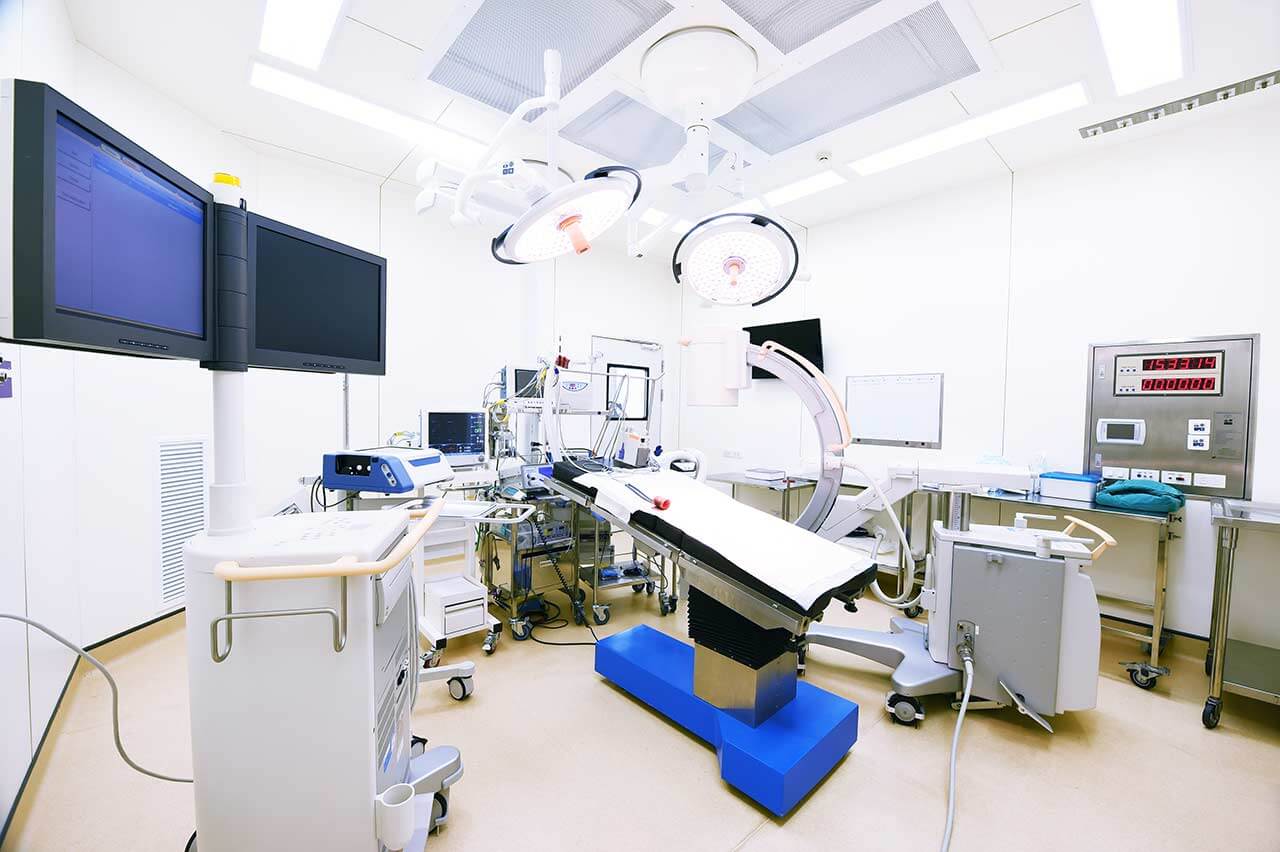
The program includes:
- Initial presentation in the clinic
- clinical history taking
- review of medical records
- physical examination
- laboratory tests:
- complete blood count
- general urine analysis
- biochemical blood test
- inflammation markers (CRP, ESR)
- blood coagulation analysis (aPTT, PT, INR)
- tumor markers
- CT/MRI scan of the head
(if indicated clinically, additional cost is 650/1200€) - histological and immunohistochemical study
(if indicated clinically, additional cost is 1000€) - nursing services
- consultation of related specialists
- treatment by head doctor and all leading experts
- explanation of individual treatment plan
Required documents
- Medical records
- MRI/CT scan (not older than 3 months)
- Biopsy results (if available)
Service
You may also book:
 BookingHealth Price from:
BookingHealth Price from:
About the department
The Department of Adult and Pediatric Neurosurgery, Spinal Surgery at the University Hospital Erlangen offers modern diagnostics and effective treatment of the full range of diseases, injuries, inflammatory processes, tumors and malformations of the brain, spinal cord and their meninges, as well as spinal diseases. Spinal surgery is performed in collaboration with doctors from the Department of Adult and Pediatric Traumatology, Orthopedic Surgery. The department admits adults and children with malformations of the nervous system, brain and spinal cord tumors, drug-resistant epilepsy and other diseases. As one of the largest medical facilities of this kind in Germany, the department's doctors annually perform more than 2,500 surgical interventions on the brain and spinal cord, peripheral nerve endings. The department's specialists also perform over 400 spinal surgical procedures annually. To achieve high success rates of the surgical treatment, doctors use the very latest equipment, including neuronavigation systems. Thanks to this, surgeons not only successfully eliminate the pathology, but also guarantee the patient maximum safety. The department has 78 beds, including 14 beds in the Intensive Care Unit. The priority goal of the department's medical team is to provide high-quality treatment focused on the patient's needs.
The Chief Physician of the department is Prof. Dr. med. Michael Buchfelder. The neurosurgeon has an excellent reputation not only in Germany, but also far beyond its borders. He can be deservely proud of over 20 years of clinical experience, as well as thousands of successful surgical procedures, which have brought patients back to a full life without pain and discomfort.
The surgical treatment of diseases of the central and peripheral nervous system is performed in four state-of-the-art operating rooms. In addition to high-tech surgical microscopes, neuronavigation systems and devices for spinal surgery with the possibility of complex 360-degree stabilization, the operating rooms are equipped with a 1,5 Tesla magnetic resonance imaging system for intraoperative imaging.
The department also offers outpatient appointments, including consultations on general pathologies of the central nervous system, diseases of the pituitary gland, spine, cancer, epilepsy, and neurovascular malformations. It also provides preoperative and postoperative care. The department's specialists annually provide outpatient medical care to more than 5,500 patients with various diseases of the central nervous system.
The primary focus of the department's neurosurgeons is on the treatment of benign and malignant tumors of the nervous system. The doctors most often deal with brain tumors. The team of neurosurgeons of the medical facility specializes in the treatment of acoustic neuroma, which is a benign tumor of one of the cranial nerves. As in many other tumors, neuroma symptoms manifest themselves only after the neoplasm reaches a large size, and therefore the tumor is quite often diagnosed by accident, during magnetic resonance imaging (MRI) for other indications. The examination for suspected neuroma involves the use of an audiogram, ultrasound ear scanning, electronystagmography, biopsy and other diagnostic tests. To treat the tumor, the department's surgeons use three main approaches: dynamic monitoring (monitoring of an auditory nerve neuroma when it is detected at the initial stages and does not manifest any symptoms), microsurgical removal of the neoplasm, and radiation therapy. The last method is most often used for contraindications to surgery or localization of a neuroma in a hard-to-reach place.
The department's therapeutic options are not limited to the treatment of benign tumors. The medical facility often admits patients with brain and spinal cord malignancies. Upon confirmation of oncology in the patient, the clinical case is considered at the tumor board with the participation of neurosurgeons, oncologists, radiologists, radiation therapists and other related specialists. The classic treatment regimen includes surgical resection of the tumor, radiation therapy, and chemotherapy. The treatment regimen is accurately thought out taking into account the particular clinical indications of the patient, on an individual basis.
The department's neurosurgeons are proud of their outstanding results in the field of surgical treatment of epilepsy, which is carried out within the specialized center. Today, there are many medications that can fight epilepsy, but in some cases the only effective way to eliminate epileptic seizures is surgery. With all the diagnostic data, neurosurgeons, neurologists, neuropsychologists, neuroradiologists and specialists in nuclear medicine have a board, during which they develop the optimal treatment tactics. If surgery is the most advisable option, doctors decide which exact intervention will be most effective for the patient. The department successfully performs interventions for resection of the epileptic focus and various modifications of hemispheric disconnection. The procedure for stimulating the vagus nerve is also widely used. The Epilepsy Center, which is part of the department, is one of the four best centers in Germany and has a 4th degree accreditation. Therefore, the patients with epilepsy can be confident that they entrust their health to highly qualified and experienced doctors.
An important area of work of the team of neurosurgeons working in the medical facility is the surgical treatment of spinal diseases, as well as traumatic injuries and degenerative changes in the spine. To provide medical care to patients with spinal pathologies, the department has a highly specialized center. To achieve excellent therapeutic results, neurosurgeons cooperate closely with orthopedists and traumatologists. The specialists most often deal with the treatment of spinal disc herniation, tumors of the spine and spinal cord, spinal stenosis, spinal inflammatory diseases and injuries. Whenever possible, operations are performed using sparing minimally invasive techniques, which contributes to the rapid postoperative recovery of the patient. To ensure the maximum safety of surgical procedures, when performing surgery doctors use modern intraoperative 3D imaging, neuronavigation systems and other computer-assisted technologies.
The department is also distinguished by its rich experience in the treatment of diseases of the central nervous system in infants, young children and adolescents (in cooperation with the Department of Pediatric and Adolescent Medicine, the Department of Neuropediatrics, Pediatric Oncology). The therapeutic spectrum includes the treatment of both common and rare diseases, including cranial malformations, meningomyelocele, spina bifida, brain and spinal cord tumors. The department's pediatric neurosurgeons use all modern surgical techniques for the treatment of young patients with pathologies of any severity.
The department's main clinical focuses include:
- Surgical treatment of acoustic neuroma
- Follow-up monitoring using MRI after initial diagnosis
- Radiosurgery or fractionated radiation therapy
- Neurosurgical operation using a surgical microscope
- Operations using intraoperative electrophysiological monitoring with registration of acoustic evoked potentials
- Surgical interventions with intraoperative stimulation of the facial and trigeminal nerve
- Surgery in sitting position to protect the facial and auditory nerves
- Surgical treatment of malignant brain tumors (special focus on the treatment of gliomas)
- Surgical treatment of pituitary tumors (about 250 operations per year)
- Microsurgical interventions
- Endoscopic interventions
- Surgery using intraoperative MRI
- Surgical treatment of spinal cord malignancies
- Surgical treatment of spinal diseases (more than 400 operations on the spine, including more than 100 stabilization operations, as well as replacement of vertebral bodies in all parts of the spine)
- Microsurgery
- Navigation-assisted surgery
- Open surgical interventions
- Surgical treatment of pathologies of the central nervous system in children of all age groups (in cooperation with specialists from related disciplines)
- Surgical treatment of epilepsy (in cooperation with the Department of Neurology)
- Microsurgical resection of certain brain areas, up to total removal (usually when the focus is located in the temporal lobe)
- Resection of particular brain areas, such as hippocampectomy or removal of the amygdala
- Resection of the brain near functionally important areas (for example, motor center, speech center, memory center, optic tracts)
- Removal of multiple lobes (multilobectomy)
- Resection of epileptogenic defects (tumors, scars, malformations)
- Resection of the cerebral cortex (hemispherotomy) and its connective structures (callosotomy), functionally important brain areas (multiple subpial transactions)
- Implantation of a system for deep vagus nerve stimulation
- Surgical treatment of cerebral aneurysms
- Open neurosurgical interventions (clipping, aneurysm wall enhancement)
- Neuroradiological endovascular procedures (coiling, stent implantation)
- Surgical treatment of hemangiomas (arteriovenous malformations)
- Classical interventions
- Neuroradiological endovascular procedures (embolization)
- Combination therapy (in rare cases)
- Skull base surgery
- Surgery in sitting position
- Electrophysiological monitoring
- CUSA device (ultrasonic aspiration system for the treatment of tumors)
- Endoscopy
- Microscopy
- Intraoperative imaging
- Neuronavigation
- Laser surgery
- Preoperative functional imaging
- 5-ALK fluorescence diagnostics
- Highly specialized, postoperative intensive care
- Surgical treatment of neurovascular compression syndromes (for example, trigeminal neuralgia, hemifacial spasm)
- Intraoperative MRI and neuronavigation
- Recurrent pituitary adenoma
- Brain tumors with indistinct boundaries (low- and high-grade gliomas)
- Surgical treatment of epilepsy
- Invasive diagnostics (implantation of electrodes into the brain) to accurately determine the localization of an epileptogenic focus
- Biopsy of hard-to-reach brain tumors
- Neurosurgical intensive care (early detection and treatment of dysfunctions of the brain and spinal cord caused by traumatic brain and spinal cord injury, intracranial hemorrhage or inflammation of the central nervous system)
- Other medical services
Curriculum vitae
Prof. Dr. med. Michael Buchfelder is the Head of the Department of Adult and Pediatric Neurosurgery, Spinal Surgery at the University Hospital Erlangen. A highly qualified neurosurgeon has over 20 years of successful clinical experience. Prof. Buchfelder leads a large team of highly qualified surgeons who perform more than 2,500 interventions annually, including about 400 spinal surgeries. The department is known as one of the largest and leading medical facilities in Germany and other European countries. Prof. Michael Buchfelder is a member of the German Society of Neurosurgery and other professional medical societies.
Doctor's clinical interests include spinal surgery, endoscopic interventions for diseases of the central nervous system, surgical treatment of epilepsy, aneurysms and hemangiomas, as well as operations for acoustic neuroma.
Photo of the doctor: (c) Universitätsklinikum Erlangen
About hospital
According to the Focus magazine, University Hospital Erlangen ranks among the best medical facilities in Germany!
The hospital is one of the leading healthcare facilities in Bavaria and offers top-class medical care distinguished by the close intertwining of clinical activities with research and training of medical students. The hospital was founded in 1815 and today is proud of its rich traditions, numerous medical achievements and an excellent reputation not only in Germany, but also in the international arena. The hospital has 25 specialized departments, 7 institutes and 41 interdisciplinary centers, whose experts work tirelessly for the benefit of their patients.
The hospital has the status of a maximum care center, and therefore it represents almost all fields of modern medicine. Oncology, transplant medicine, and robot-assisted surgery are among the top priorities of the clinical activities of the medical complex. Oncology is represented by the Comprehensive Cancer Center Erlangen, which is one of 13 centers of excellence in Germany certified by the German Cancer Society. The university hospital has a high-tech center with high success rates for heart, liver, kidney, pancreas, cornea and bone marrow transplants. In addition, the hospital is a leader in the use of robot-assisted surgery. The medical facility has at its disposal innovative robotic technologies, in particular the da Vinci Surgical System, with the help of which surgeons perform many sparing interventions in various medical fields.
The medical team of the hospital consists of highly professional therapists, surgeons and nursing staff. The focus of their efforts is on the patient, his health and peace of mind, as well as comfort during treatment. The clinical practice of doctors is based on an individual approach to each case, which results in high treatment success rates. State-of-the-art technical equipment also plays an important role in the therapeutic process. The hospital is proud of the most advanced devices for imaging diagnostics (X-ray, ultrasound, CT, MRI, PET-CT, SPECT-CT, etc.), endoscopic examinations, laboratory tests, as well as specially equipped operating rooms for robot-assisted interventions, image-guided therapeutic manipulations, minimally invasive and classical surgeries of any complexity. Thus, the doctors of the university hospital have all the necessary resources to effectively treat the most severe pathologies and save lives.
The combination of high-tech equipment, experienced and highly qualified personnel, as well as strict adherence to the standards of modern medicine, form a solid foundation for the provision of the best medical care at the European level. An undeniable proof of the high prestige of the hospital is the constantly growing number of patients who come here from various regions of Germany and other countries of the world.
Photo: (с) depositphotos
Accommodation in hospital
Patients rooms
The patients of the University Hospital Erlangen live in comfortable rooms with light colors and modern design. Each patient room has an ensuite bathroom with shower and toilet. The furnishing of the patient room includes an automatically adjustable bed with an orthopedic mattress, a bedside table, a wardrobe, a table and chairs for receiving visitors, a TV, a radio and a telephone. Wi-Fi can be provided upon request. The use of a mobile phone is prohibited in many rooms of the hospital.
Patients can also live in enhanced-comfort rooms with a more sophisticated design. The enhanced-comfort rooms additionally include upholstered furniture, a minifridge and a safe.
Meals and Menus
The hospital offers healthy and tasty food distinguished by many awards, including the 1st place in the prestigious ESSEN PRO GESUNDHEIT competition of the Bavarian State Ministry of the Environment and Consumer Protection.
The patient and the accompanying person have three meals a day. Breakfast is served buffet style: scrambled eggs, boiled eggs, sausage, cheese, bread and buns with butter and jam, cereals, etc. There are three set menus for lunch and dinner to choose from: a classic menu featuring local cuisine dishes, a Mediterranean menu and a vegetarian menu.
If for some reason you do not eat all the foods, you will be offered an individual menu. Please inform the medical staff about your dietary preferences prior to the treatment.
The hospital also houses many cafeterias, which will delight with a wide range of delicious dishes and drinks.
Further details
Standard rooms include:
Religion
The hospital regularly hosts catholic and evangelical devine services. The services of representatives of other religions are available upon request.
Accompanying person
During an inpatient program, an accompanying person can stay with you in the patient room or in a hotel of your choice.
Hotel
During an outpatient program, you can stay in a hotel of your choice. The managers will help you choose the most suitable options.




